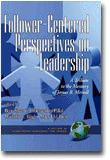
Follower-Centered Perspectives on Leadership
A Tribute to the Memory of James R. Meindl
Edited by:
Raj Pillai, California State University, San Marcos
Michelle C. Bligh, University of Nebraska
Mary Uhl-Bien, University of Nebraska
A volume in the series: Leadership Horizons. Editor(s): Michelle C. Bligh, Claremont Graduate University. Melissa Carsten, Winthrop University.
Published 2009
The majority of leadership theories and studies have tended to emphasize the personal background, personality traits, perceptions, and actions of leaders. From this perspective, the followers have been viewed as recipients or moderators of the leader's influence, and as vehicles for the actualization of the leader's vision, mission or goals. One of the major challengers of this dominant view was the late James R. Meindl. As an alternative to the leader-centric perspective on leadership, Meindl offered a follower-centric approach that views both leadership and its consequences as largely constructed by followers and hence influenced by followers' cognitive processes and inter-follower social influence processes. As a tribute to Jim Meindl and his contributions to the field of leadership studies, Information Age Publishing is releasing a book on follower-centered approaches to leadership. The book covers a wide variety of perspectives that acknowledge the active roles of followers in the leadership process. These include the psychoanalytical perspective, leadership categorization theory, social identity theory, the shared leadership approach, attribution of charisma through social networks, the role of the media in constructing images of the leader, the social construction of followership, vision implementation by followers and a post modern approach to followership. It is hoped that the volume will provoke readers to reflect upon and extend Jim Meindl's seminal work on followership. ars and practitioners curious about the nature of research on leadership, both those with much research exposure and those new to the field.
CONTENTS
Series Editor’s Note. Introduction. From Passive Recipients to Active Co-Producers: Followers’ Roles in the Leadership Process, Boas Shamir. Toxic Leaders and the Fundamental Vulnerability of Being Alive, Jean Lipman-Blumen. Implicit Leadership Theories as Dynamic Processing Structures, Megan E. Medvedeff and Robert G. Lord. Extending the Follower-Centered Perspective: Leadership as an Outcome of Shared Social Identity, Daan van Knippenberg, Barbara van Knippenberg, and Steffen R. Giessner. Sharing Leadership: Who, What, When, and Why, Lynn R. Offermann and Noelle F. Scuderi. Leadership Embedded in Social Networks: Looking at Inter-Follower Processes, Margarita Mayo and Juan Carlos Pastor. Organizational Change, Member Emotion, and Construction of Charismatic Leadership: A Follower-Centric Contingency Model, Chao C. Chen, Liuba Y. Belkin, and Terri R. Kurtzberg. Through Thick and Thin?: Follower Constructions of Presidential Leadership Amidst Crises, 2001–2005, Rajnandini Pillai, Jeffrey C. Kohles, and Michelle C. Bligh. Putting the Visual into the Social Construction of Leadership, Brad Jackson and Eric Guthey. The Romance of Leadership and the Social Construction of Followership, Mary Uhl-Bien and Rajnandini Pillai. Here Today, Gone Tomorrow: Follower Perceptions of a Departing Leader and a Lingering Vision, Melissa K. Carsten and Michelle C. Bligh. Not Leaders, Not Followers: A Postmodern Discourse of Leadership Processes, Dian Marie Hosking. The Social Construction of a Legacy: Summarizing and Extending Follower-Centered Perspectives on Leadership, Michelle C. Bligh, Rajnandini Pillai, and Mary Uhl-Bien. Romancing, Following, and Sensemaking: James Meindl’s Legacy, Karl E. Weick. James R. Meindl.
-
Paperback978-1-59311-547-0
Web price: $45.04 (Reg. 52.99)
-
Hardcover978-1-59311-548-7
Web price: $80.74 (Reg. 94.99)
- eBook9781607527022

- BUS071000 - BUSINESS & ECONOMICS: Leadership
- BUS041000 - BUSINESS & ECONOMICS: Management
- BUS030000 - BUSINESS & ECONOMICS: Human Resources & Personnel Management
-
 Advancing Relational Leadership Research
A Dialogue among Perspectives
Advancing Relational Leadership Research
A Dialogue among Perspectives
-
 Complexity Leadership
Part 1: Conceptual Foundations
Complexity Leadership
Part 1: Conceptual Foundations
-
 Dark and Destructive Leadership
Dark and Destructive Leadership
-
 Implicit Leadership Theories
Essays and Explorations
Implicit Leadership Theories
Essays and Explorations
-
 Leadership and Complexity
Vol II: Empirical Evidence and Practical Applications
Leadership and Complexity
Vol II: Empirical Evidence and Practical Applications
-
 Teaching Leadership
Innovative Approaches for the 21st Century
Teaching Leadership
Innovative Approaches for the 21st Century
-
 The Connecting Leader
Serving Concurrently as a Leader and a Follower
The Connecting Leader
Serving Concurrently as a Leader and a Follower

